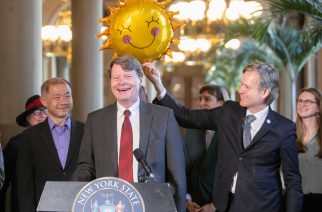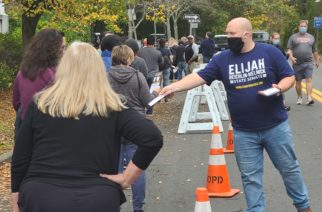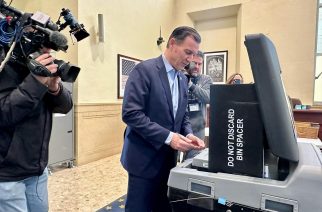
Reporters wearing face masks in the Governor’s press room in the state Capitol on Wednesday, April 15. Beginning Friday, every New Yorker will be required to wear some form of mask or face covering when in public and social distancing is not possible, such as on mas transit or shopping in a store.
The governor has issued an executive order requiring all people in New York to wear a mask or a face covering in public situations where social distancing cannot be maintained, such as on public transportation and in stores.
The order goes into effect on Friday, April 17. The decision to require the widespread use of masks comes as hospitalization rates are slowing, a trend officials want to continue.
We have the infection spread down to a manageable number, we’ve accomplished that,” said Cuomo.
As of April 14, there were 18,335 New Yorkers hospitalized, 5,205 of them in ICU units, 4,407 are on ventilators and 1,908 were discharged from the day before. There 752 deaths on Tuesday — 707 were in hospitals, and 45 in nursing homes, bringing the cumulative death toll in New York to 10,834 people.
With more widespread testing, the total number of positive cases in New York has grown to 213,779.
Cuomo said he hopes New York may be at the apex of the infection curve, and wants to maintain the downward trend, thus the need for facemasks to prevent new infections.
“You’re right to go out for a walk in the park, go out for a walk because you need to get out of the house, the dog is getting on your nerves. Fine, don’t infect me. You don’t have a right to infect me,” Cuomo said. “If you are going to be in a situation in public where you may come into contact with other people in a situation that is not socially distanced, you must have a mask or a cloth covering nose and mouth. That is by executive order.
“So, if you’re going to get on public transit, you’re going to get on a bus, you’re going to get on a subway, you’re going to stand on a subway platform, you’re going to walk in a neighborhood that is busy, you’re going to be on a sidewalk, you’re going to pass other people on a sidewalk, you’re not going to able to maintain social distancing, you must wear a mask or cloth or an attractive bandana or a color-coordinated bandana cloth, but you have to wear it in those situations.”
Cuomo said there is no plan at the moment to issue fines or other penalties for not complying. He hopes New Yorkers will understand the urgency and wear them because it is the right thing to do.
“We’ll give people three-day notice to allow compliance. Just on the off chance that somebody doesn’t have a cloth covering or a mask, and we’ll go from there.”
According to Gov. Cuomo, the best tool to reopen New York state is large scale testing of possible coronavirus cases. New York has been aggressive in its testing for the virus completing more than 500,000 tests. However, Cuomo admitted that New York cannot complete a larger scale of testing without help from the federal government.
“If you have a state that has a lower need. Yes, they may be able to do it. But when you have a state that has to do a large number of these tests. I’m telling you we can’t do it without federal support.” said Cuomo.
Last week the New York State Department of Health announced that it had developed its own antibody test to detect the virus. This week will begin the use of the antibody test, this will add 2,000 tests per day via the finger prick test. New York has also asked the FDA for expedited approval of antibody finger-prick tests that could test up to 100,00 New Yorkers a day.
While different possible vaccines are in the works, it could be 12 to 18 months before states and medical professionals would be able to administer it to the public. Cuomo also mentioned new medical treatments that are being tested or COVID-19 treatment such as convalescent plasma, antibody testing, and hydroxychloroquine.
Also announced Wednesday:
- The state will begin conducting antibody tests this week, prioritizing front-line workers, up to 2,000 tests per day using a finger prick test
- The state is giving 100 ventilators to Michigan and 50 ventilators to Maryland
- Under executive order, all nursing homes must inform family members of residents of known COVID-19 cases in the facilities
- Also under executive order, individuals assisting with COVID-19 response can stay in a hotel in New York City for more than 28 days without becoming a tenant
- SUNY and CUNY colleges across the state are using 3D printers on their campuses to produce personal protective equipment for front-line medical workers









